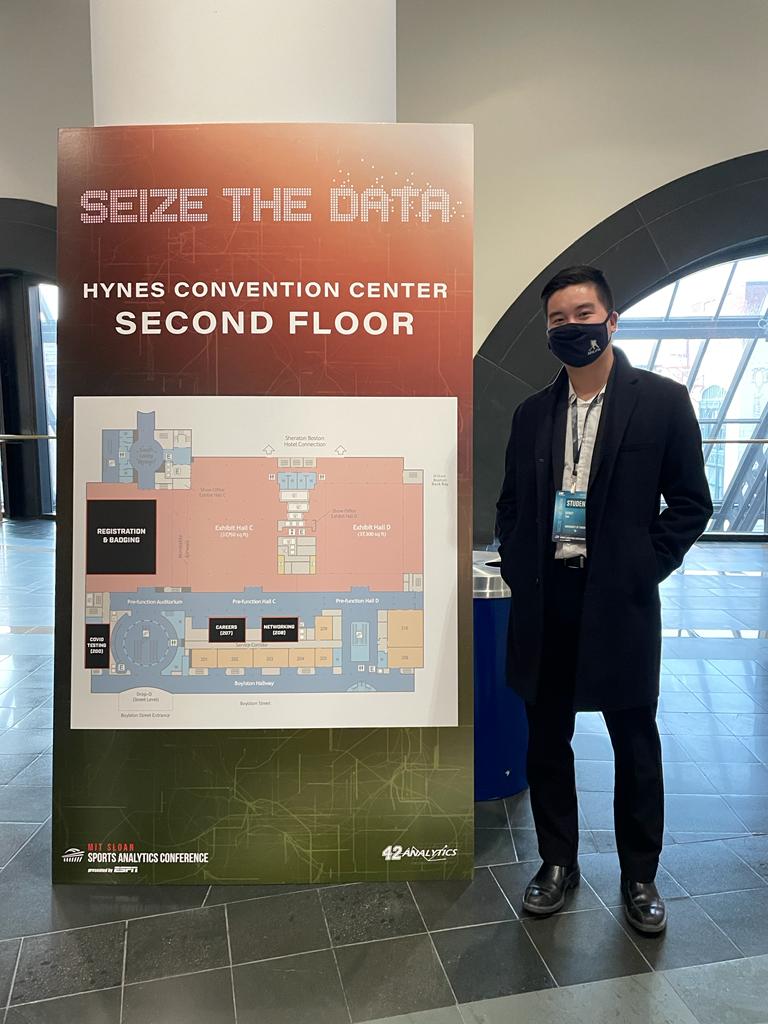Students aspiring for a career in sports law can find no better networking platform

What’s the common thread joining: WNBA legend, Sue Bird; UFC Hall of Famer, Forrest Griffin; bestselling author, Malcolm Gladwell; father of baseball sabermetrics, Bill James; President of the Buffalo Bills and the Buffalo Sabres, Kim Pegula; WWE trailblazer and Chief Brand Officer, Stephanie McMahon; and the University of Toronto Faculty of Law?
Answer: they were all in Boston attending the two-day MIT Sloan Sports Analytics Conference (SSAC) in early March, along with nearly 1,000 of the sports industry’s thought leaders and aspiring students.
I spent my entire law school career pursuing opportunities in sports law, while introducing the industry as a potential career path to countless students with whom I’ve had the privilege of conversing. I was humbled to have the opportunity to represent U of T Law at this year’s MIT SSAC as the metaphorical denouement to my journey as a law student. Thank you to Cassels, Brock & Blackwell LLP and the law school’s Advancement Office for their support.
MIT SSAC is the world’s largest student-run conference. Founded by Daryl Morey, President of Basketball Operations for the Philadelphia 76ers, and Jessica Gelman, CEO of the Kraft Analytics Group, the conference is the premier forum for industry-leading discussions about the future of sports. Legislators also routinely participate in these conversations at MIT SSAC—just four years ago, President Barack Obama spoke at the conference, sharing his thoughts on “the importance of team sports, his support for diversity in sports, and the need for reform in college sports.”
I started Day 1 attending a fireside chat with Michael Rubin, CEO of Fanatics, and Gary Vaynerchuk, CEO of VaynerMedia. Rubin and “Gary V” (as he is known in the industry) are “two of the most prolific disruptors in sports and entertainment,” and they extensively discussed one of the biggest innovations in the sports industry in decades: non-fungible tokens, or NFTs. For newcomers to the burgeoning NFT industry, you can learn more about the utility and potential of NFTs here (full disclosure: I wrote the referenced article).
This panel set the tone for the rest of the conference, as NFTs became the main buzzword of MIT SSAC. The conference organizers even minted souvenir NFTs for all attendees, which has to be one of the best conference gifts I’ve ever received.
Beyond NFTs, there was a panel consisting of Miguel Cardona, the U.S. Secretary of Education; Maura Healey, Attorney General of Massachusetts; Laurie Hernandez, Olympic gold medalist in artistic gymnastics; and Sue Bird, future WNBA first-ballot Hall of Famer, discussing the impact of the Title IX legislation on equality in sports. Another panel, moderated by Malcolm Gladwell, examined policy and legislative considerations for the inclusion of transgender athletes in sports.
On Day 2, I met representatives from Canadian-based NFT leader, Dapper Labs, and learned about their blockchain, Flow, and their experiences in the currently unregulated NFT space. Yet another fireside chat featured NFL Hall of Famer, Calvin “Megatron” Johnson, as he commented on his post-playing venture into the cannabis business and his views on the future of the industry. To end the conference, I attended a panel about the legislative challenges of sports gambling companies, where famed member of the MIT Blackjack Team and current VP of Microsoft for Startups, Jeff Ma, critiqued the company lines presented by executives of Caesars Entertainment and FanDuel. The conversation was tense at times, but the discourse was refreshing in the sense that Ma vocalized the thoughts of many who do not have an opportunity to challenge corporate decision-makers to consider oft-neglected stakeholders.
In total, there were 30 panels, 25 presentations, a hackathon, a research paper competition, a case competition, a start-up competition, a student mentorship program, and career development meetings for recruitment, among many other events. Even as a passionate student of sports law, I was astonished by the law’s high relevance in many of the panels, such as diversity and inclusion, cannabis, e-sports, gambling, asset investment, and crypto.
The legal industry is one of professional networks; the more ingrained in the fabric of your field of law, the more successful you’re likely to be. Thus, students aspiring for a career in sports law, or any of the aforementioned tangential areas of law, can find no better networking platform than the MIT Sloan Sports Analytics Conference. Make yourself known to the industry leaders, and you never know what it might lead to in the future.
Perhaps I’ll see some of you at the conference in the years to come—reach out and we’ll get some Boston chowda together!





